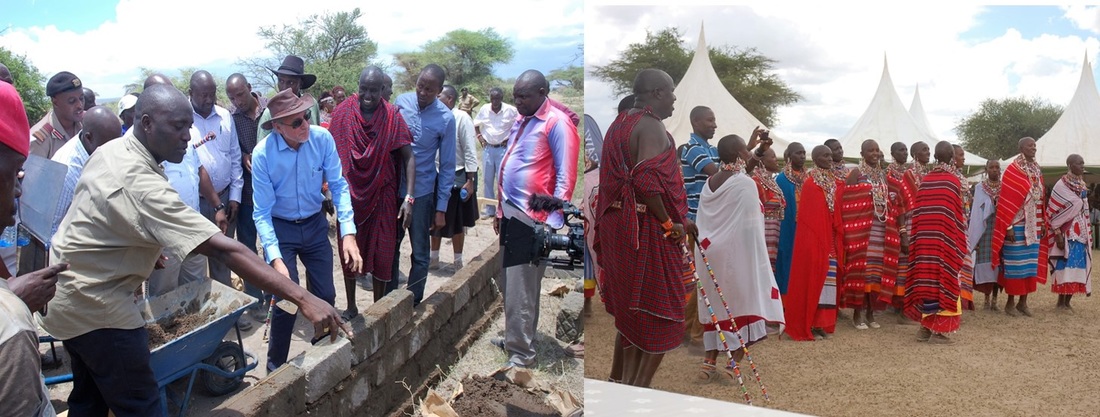 Launch of the Amboseli Nongotiak Centre by the Dutch Ambassador, Governor of Kajiado, Director General KWS, local leaders, NGOs and community
Launch of the Amboseli Nongotiak Centre by the Dutch Ambassador, Governor of Kajiado, Director General KWS, local leaders, NGOs and community The official launch of the Nontotiak site was held on the 18th March, attended by a large crowd of some 800 community leaders and members gathered in a circle of marquee tents. Dr. David Nkedienye, Governor of Kajiado County, Paul Ntiati, Deputy Governor, the Cabinet Secretary for Lands, County Commissioner, District Commissioner and dozens of other officials attended the launch. The Dutch Ambassador, Frans Makken, was asked to lay the foundation stone for the Amboseli Ecosystem Trust offices, based on the funding the Dutch Government Institutional Support had given for community enterprises through the African Conservation Centre.
The ambassador and governor also officially cut the ribbon opening the Maasai home stay accommodation and congratulated the initiative, led my Joyce Maitumo and the Amboseli Women’s Group. Daniel Lolterish, chairman of Ololorashi Group Ranch and the Amboseli Ecosystem Trust, led he celebrations in saying how important Nongotiak is to the Maasai community as their centre for planning, managing and coordinating AET activities and the Amboseli Ecosystem Management Plan. The plan is a partnership of many organizations with AET as the coordinating and implementing body.
Emmanuel Kanai, chairman of the Amboseli Tsavo Group Ranch Conservation Association, spoke next and was blunt about the hardship the community faces in conserving wildlife and the sacrifices it makes.
“The Maasai have been the real custodians of wildlife in Amboseli, he said, and yet suffer most. Lions and elephants have grown in numbers and no longer fear people. Children can’t go to school, farmers and herders are losing crops and livestock, yet where is the compensation long promised? The lives and livelihoods of the community must come first, then we can afford to tolerate wildlife and guard it as our own. All the promises of compensation made by government are empty. Tolerance for wildlife is dropping fast, for elephants and lions especially,” he said.
The ambassador commented on how important wildlife is for the world, how much the community has done to conserve wildlife, and the role the Dutch government has played in community-based conservation programs in Amboseli, including funding for Nongotiak. Dickson Kaelo, Director of the Kenya Wildlife Conservancy Association, spoke of the need to have more conservancies and improve their management. KWCA is ready to help the Amboseli community.
David Western gave a brief historical review of the pioneering role Amboseli has played in shaping conservation policies and practices in Kenya and around the world, and the challenges it now faces in the rising conflict between development and wildlife conservation, especially over space.
“We must strike a balance, using the Amboseli Ecosystem Management Plan as a start. We must go further to incorporate livestock, agriculture and development as well as physical planning in the AEMP”, he said.
Lucy Waruingi, Director of the African Conservation Centre, reviewed the role ACC has played in Amboseli over the years and its commitment to building community capacity through the Amboseli Ecosystem Trust.
The speech by the new director of Kenya Wildlife Service, Katili’s Mbathi, who arrive in after the launch of the centre and to highlight the Amboseli Ecosystem Management Plan, was read by his deputy. It stressed the importance of the Amboseli Ecosystem Management Plan, co-signed by KWS and AET and supported by the many other organizations involved.
Governor Dr. David Nkedienye was in a frank mood when he addressed the large crowd angry at the toll elephants are taking on farms and infrastructure, and depredations by lions and hyenas on livestock. “The Maasai are getting a raw deal”, he said. “Much as I am a professional conservationist, I am laying it on the line: elephants must be managed if they are to find a place outside parks. How many elephants can Amboseli carry? What plans does KWS have to limit the numbers and contain elephant impact?” he asked.
Katili Mbathi, Director of KWS, read a speech prepared by the Cabinet Secretary for the Environment, Prof. Judi Wakhungu, who was unable to attend until the following day. She reinforced the Ministry’s commitment to address human-wildlife conflict through the county committees.
The meeting was important for several reasons. It rallied the community around its own conservation efforts and solidified the central role Nongotiak will play as a centre for information, planning and oversight of the Amboseli Ecosystem Management Plan. It also gave the community a chance to greet the new KWS director and vent their feelings over the rising levels of conflict. Finally, it gave the new director a window onto the challenges facing KWS as the elephant poaching crisis subsides. The bigger longer-term challenges lie in finding space and a place for wildlife beyond parks--and beyond the conservancies--which have been the sole policy focus of KWS outside parks so far.
 RSS Feed
RSS Feed
